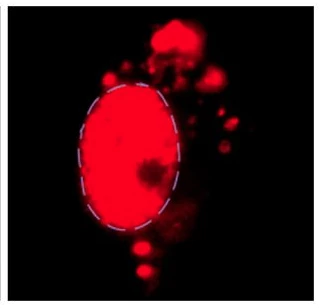Studies have shown that inhibition of RIPK1 activity can reduce inflammation and neuronal cell death in neurodegenerativ

Studies have shown that inhibition of RIPK1 activity can reduce inflammation and neuronal cell death in neurodegenerative diseases

Copyright © iCell Bioscience Inc, Shanghai 2018-2019
Neurodegenerative diseases, including Alzheimer's disease (AD), lateral sclerosis (ALS), frontotemporal dementia (FTD), etc., are all diseases associated with aging. Neurodegenerative diseases bring great pain and burden to patients and families. However, there is no medicine in the world that can effectively treat neurodegenerative diseases.
The World Health Organization predicts that by 2040, neurodegenerative diseases will replace cancer and become the second most deadly disease in humans. But at present, people do not understand how aging promotes the development of neurodegenerative diseases. Therefore, the molecular mechanism of aging promoting neurodegenerative diseases is one of the key topics in neuroscience research.
Neurodegenerative diseases are closely related to genetic mutations, but it is unclear how these genetic mutations interact with aging to induce neurodegenerative diseases, which has led to the development of drugs and methods for the treatment of neurodegenerative diseases is very difficult.
After years of research, the research group of the Institute of Biological and Chemical Interdisciplinary Research, Shanghai Institute of Organic Chemistry, Chinese Academy of Sciences found that RIPK1 activation can be used in mouse models of neurodegenerative diseases and in human Alzheimer's disease and lateral sclerosis disease samples. detected. At the same time, inhibition of RIPK1 activity can attenuate inflammation and neuronal cell death in a mouse model of neurodegenerative diseases.

The team found an important role for the key regulatory factor RIPK1 in the cell death signaling pathway in neurodegenerative diseases. RIPK1 is a member of the "receptor-acting protein kinase" family and is responsible for the initiation and regulation of important physiological processes such as apoptosis, cell necrosis and cellular inflammation.
The researchers found that the ALS risk gene TBK1 binds directly to the cell death complex and phosphorylates RIPK1, thereby inhibiting RIPK1 activation and concomitant programmed cell death. In the absence of TBK1, RIPK1 is released from the suppressed state, so it is easier to activate and trigger cell death under the stimulation of tumor necrosis factor.
This phenomenon perfectly explains the cause of death in TBK1-deficient mouse embryos. When RIPK1 kinase activity is absent (RIPK1 D138N), TBK1-deficient mice survive well. RIPK1 is a key factor in the regulation of death signaling, and its activity is regulated by a variety of proteins.
The researchers found an interesting phenomenon through analysis, that is, another RIPK1 inhibitor TAK1 increased in activity when TBK1 was deleted, which enhanced the inhibition of RIPK1, and to some extent compensated for the consequences of TBK1 deletion.
Mutations in TBK1 are important factors leading to a part of familial ALS/FTD, but most carriers of TBK1 mutations still develop after age 60, suggesting that aging plays an important role in the initiation of ALS/FTD by TBK1 mutations. . Study how aging promotes ALS in the absence of partial TBK1. The gene expression changes in the frontal cortex of young and elderly people were analyzed, and another RIPK1 inhibitor TAK1 was found to be significantly reduced in the brain of the elderly.
This phenomenon suggests that aging will lead to a gradual decrease in the inhibitory effect of TAK1 on RIPK1. Therefore, in the TBK1 partially deleted population, the decline of TAK1 caused by aging will overlap with the deletion of TBK1, further promoting the activation of RIPK1 and leading to the occurrence of neurodegenerative diseases.
Further experiments in mice have found that inhibition of RIPK1 activity can well rescue all ALS/FTD disease symptoms and behavioral changes, demonstrating that excessive activation of RIPK1 is a key factor in the pathogenesis of ALS/FTD. RIPK1 is an important target for the treatment of ALS/FTD.
Aging can cause degradation of various organ functions, including the nervous system, but it is not known how aging promotes disease at the molecular level. It is one of the frontier issues in the field of neuroscience to explore the molecular mechanism of aging, especially the key molecular regulation mechanism of brain aging to neurodegenerative diseases.
This study is the first to clearly explain the TBK1 deletion and the reasons for the increased risk of ALS/FTD caused by genetic mutations. It is also the first time to discover the molecular mechanism of aging on the pathogenesis of ALS/FTD.
 Loading ....
Loading ....
